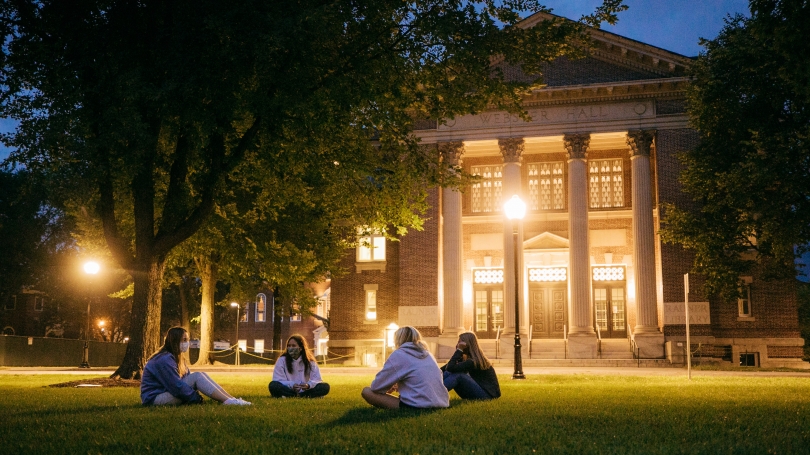
Rauner Brings Collection to Students' (Virtual) Fingertips
Posted on April 20, 2021 by Bill Platt
Anthropology of medicine class explores historic epidemics under COVID restrictions.
In a normal year, Associate Professor Sienna Craig's first-year seminar, "The Values of Medicine," exploring the history of western medicine across centuries, through an anthropological lens, would have brought students to Dartmouth Library's Rauner Special Collections Library to research rare manuscripts and artifacts, such as a book written by a witness to the 1665 London plague; public health handbills and posters from the 1832 cholera epidemic; and popular magazine advertisements from the late 19th-century related to female "hysteria."
Under the restrictions of the COVID-19 pandemic, the winter-term class still did original research in the collection, except that the students were encountering the materials from across campus or around the globe, and their four culminating projects are now on display digitally rather than on the second floor of Rauner.
"This was my first exposure to Rauner. They have a lot of really amazing stuff in there," says Madison Spivak '24, who was on campus for the fall and winter terms. "Some of the sources we were using were from the 16th century, and some groups had sources from even before that."
Spivak worked on her exhibition project, "Hysteria: Pathologizing the Female Experience," with Emma Garland '24, who was also on campus, and Natalie Shapiro '24, who was at home in South Carolina, and Erik Teuuis '24, who was at home in Massachusetts.
"It was really cool, even just to see the scans and know that one day we could physically see them," Spivak says.
Jay Satterfield, head of special collections, and Laura Braunstein, digital humanities librarian, worked closely with the students to "make the remote experience vivid and rewarding," Craig says. Betty Kim '20, the Edward Connery Lathem '51 Digital Library Fellow, helped digitize and upload scores of documents and objects from the collection, and Braunstein helped students work with the library's Omeka digital exhibition platform as they developed their final projects.
"It was important to make the encounter with the collection feel as intimate as possible," Satterfield says. During small group student meetings, he would join remotely from Rauner. "As they reported out to the class about their document or their object, I had the object underneath a camera and I was turning the pages as they talked about it," Satterfield says.
"They got a sense of the real through that. It was not a static scan that they were working from."
Benjamin Levesque '24, whose team produced "Cholera and COVID-19: Change and Continuity in the Landscape of Public Illness," agreed.
"While we couldn't interact with the materials directly, Professor Craig and Jay Satterfield brought them to our virtual fingertips," Lavesque says. "I look forward to when we can explore Rauner ourselves and examine the original documents from our exhibit."
Craig says working with these materials remotely during the pandemic seems to have increased her students' appreciation of Rauner as a unique resource.
"It's always the case that when we teach this class, first-year students are awakened to the knowledge that this resource exists and many of them continue to return to Rauner over their four years at Dartmouth," Craig says.
"What this class and these circumstances have done is really heightened the sense among these students of what an extraordinary resource it is and how special it is to be able to learn from these kinds of primary materials."
Braunstein says working under COVID restrictions highlighted the vitality of the digital humanities. "For me, this was taking something that had a very vibrant life in terms of student engagement even before the pandemic and seeing how well it fit into the restrictions of the pandemic and in some ways made this material more accessible.
"What I'm really interested in seeing, as this student exhibit program develops, is how can we use it to engage students in the future, as well as opening their research and writing to a broader audience," she says.
The Dartmouth Library is building a permanent collection of Dartmouth student course exhibits, which will grow as more classes integrate digital projects.
For the most recent information on Dartmouth's response to the pandemic, visit the Dartmouth Together COVID-19 website.
William Platt can be reached at william.c.platt@dartmouth.edu.